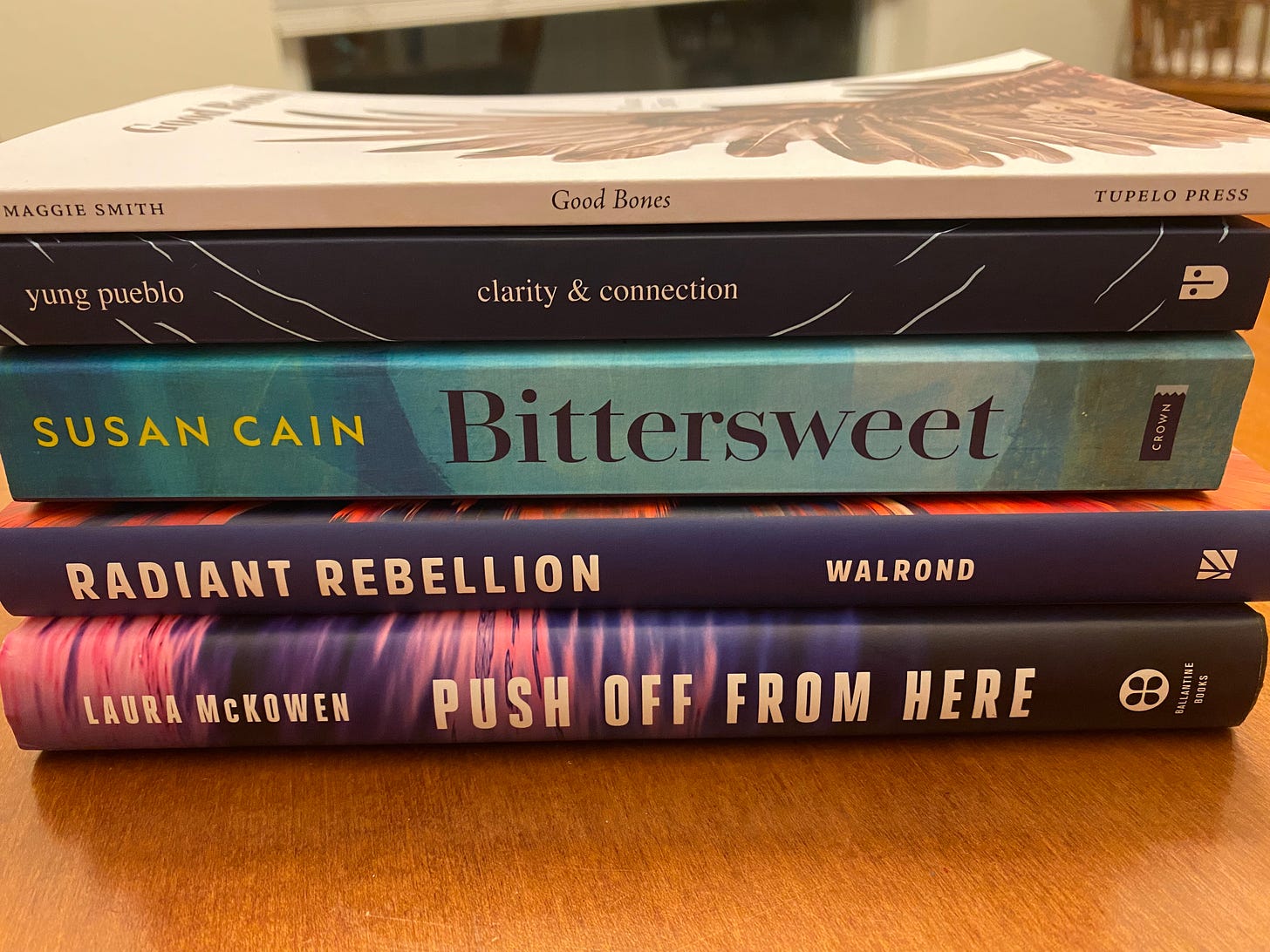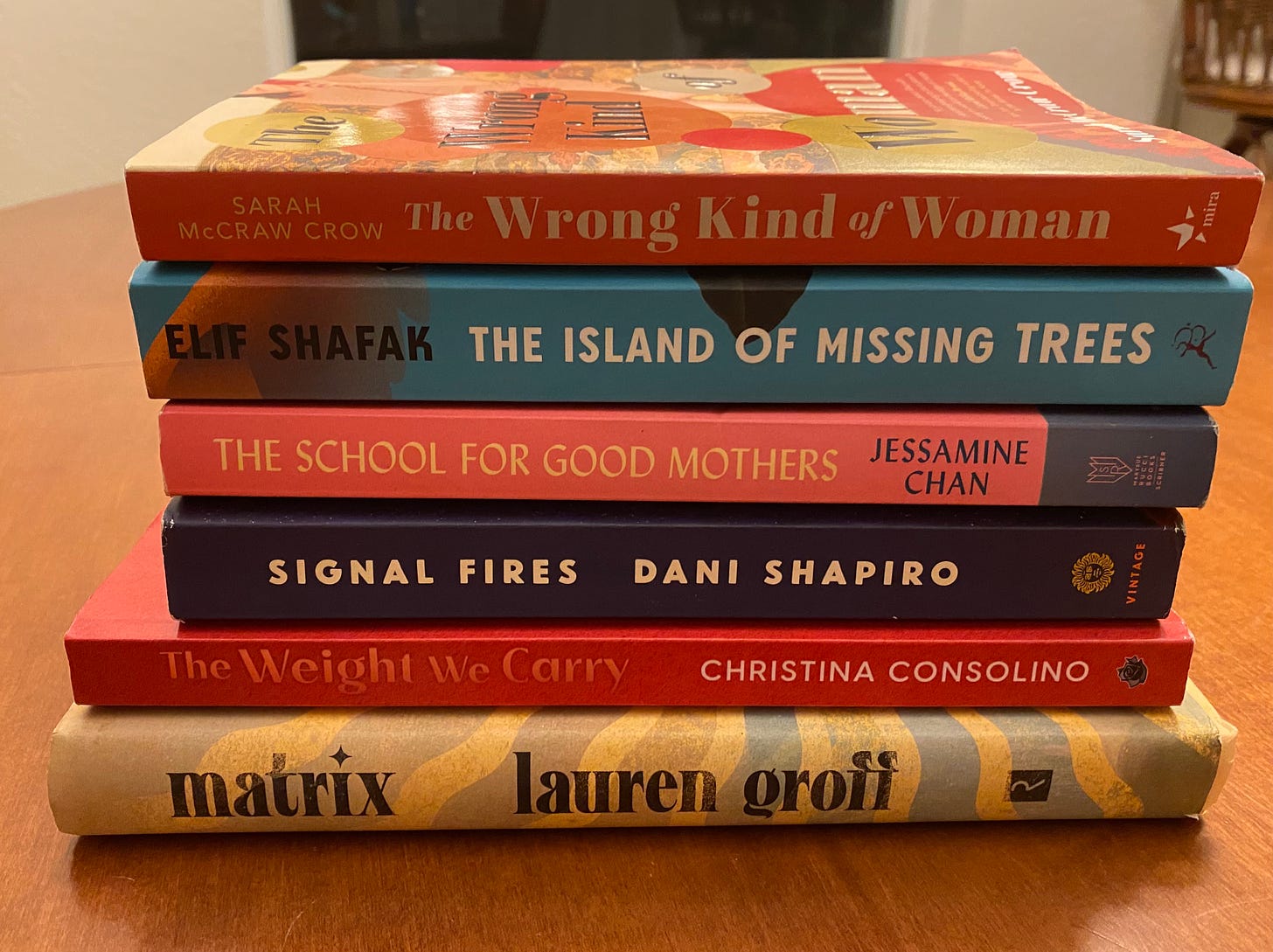Part 3: Year of Reading for Restoration and Renewal
Here is the third and last installment of brief reviews of the 50 books I read in 2023, all of which nurtured clarity, connection, community and creativity in my life.
Without further ado, let’s launch right into the final 17 books I read this year, featuring many writers here on Substack!
Clarity
Push Off From Here: Nine Essential Truths To Get You Through Sobriety (And Everything Else) by
: I credit Laura, who writes on Substack, with giving my early sobriety a huge lift when a friend recommended her first book, the memoir We Are The Luckiest: The Surprising Magic of a Sober Life. I soon began to subscribe to her emails and that’s how I came to take part in her life-changing courses The Bigger Yes and The Practice in 2022 and 2023. Laura is one of the wisest and most honest, intuitive teachers I’ve ever known. Her writing beautifully and powerfully witnesses the kind of transformation possible for her and for others when applying her “nine essential truths.” This book is part vivid storytelling and part amazing tools and mindset shifts to see you through sobriety or any other struggle you may be facing.Radiant Rebellion by
, writing here on Substack, is one of my final reads of 2023, and what a way to end the year, and enter 2024, the year I turn 64. As she approached her own milestone birthday Walrond was inspired to investigate how we can reclaim aging, cultivate joy and resist ageism. She speaks to psychologists, social workers, neurologists, activists and clergy and embarks on her own experiments that help her rebel against convention—and invites us all to raise a little hell.In Bittersweet: How Sorrow and Longing Make Us Whole by
I found myself saying “yes!, that sound like me!” over and over. Bittersweetness is a tendency to states of longing, poignancy and sorrow, an acute awareness of passing time, and a curiously piercing joy at the beauty of the world. Light and dark, birth and death, bitter and sweet, are forever paired if you fall into this way of being. Cain, who recently moved her newsletter to Substack, is a compelling, intimate storyteller and the book is also chock full of fascinating research, conversations with experts, and her own examination of the complex relationship with her mother. When she writes the following, I understand instantly what she means:Endings will give way to beginnings just as much as beginnings give way to endings. ..the task is not only to let the past go, but also to transform the pain of impermanence into creativity—and transcendence.
Good Bones by
: Earlier this year I had read We Can Make This Place Beautiful, Smith’s beautiful memoir and now it was high time for me to read her poetry. I loved every one of the poems, from “Rain, New Year’s Eve”: “Let me listen to the rain’s one note/and hear a beginner’s song,” to “Sky”: “Think of sky not as blue, not as over,/ but as the invisible surround, a soft suit/you wear close to the skin.” “Good Bones” is the poem that went viral when it was published in 2016 the same week as the Pulse Nightclub mass shooting in Orlando. Her words seared into anyone reeling from the horror of that tragedy:For every loved child, a child broken, bagged,
sunk in a lake. Life is short and the world
is at least half terrible, and for every kind
stranger, there is one who would break you,
though I try to keep this from my children.
Clarity & Connection by
: I discovered Yung, which is the pen name of Diego Perez, on ’s former podcast. I have been following him on Instagram and reading his books ever since. He is a poet, meditator and speaker and has also written the book Lighter and this year, The Way Forward. The name yung pueblo means 'young people' and it serves to remind him of his Ecuadorian roots, his experiences in activism and that the collective of humanity is in the midst of important growth. As clarity is one of my life’s guideposts, I was attracted to this collection, for lines like this:…and then life starts to call you back
into its arena of possibility;
it reminds you that all is not lost
and that even though a chapter ended,
there is still a longer story to be told.
Connection
Signal Fires by Dani Shapiro: This novel broke my heart in about a million pieces, in a good way. As she often does, Shapiro has family secrets at the heart of this novel, which traces the story of two families whose lives intersect in fateful ways. Shapiro is a beautiful writer, full of compassion for her characters and this is ultimately a hopeful story about enduring human connection. I was particularly riveted by one of the subplots, when the mother in one of the families begins to suffer from dementia and the way Shapiro skillfully interlaces her story with that of a young boy, a neighbor—I will never forget it.
The Island of Missing Trees by
: My daughter Marielle had been encouraging me to read this novel for a couple of years and I soon realized why. I loved it every bit as much as she promised I would. I don’t think I will ever regard a fig tree in the same way again. Set in the 1970s just before the civil war on Cyrpus between Greek and Turkish Cypriots, it is a love story told during that tumultuous time as well as the present day, from the perspective of a sad and lonely teenage girl aching to know her true story. The wisest character of all is the fig tree who narrates at one point: “Trees might not have eyes, but we have vision.”The School for Good Mothers by Jessamine Chan: This novel was scarily good, as Chan explores how far society might take the idea of what makes “a good mother.” Set in the near future, Frida Liu has one “very bad day” as an overwhelmed first-time mother and leaves her toddler Harriet alone at home for what she intends to be a short time. Instead, lack of sleep, distraction, all sorts of reasons mothers can understand, cause her to be away longer and her crying daughter is removed after a neighbor alerts police. Before long, Frida is forced to give all parental rights to the child’s father, from whom she is divorced, and enters a Big Brother-like institution that measures the success or failure of a mother’s devotion. That’s when the real nightmare begins—for Frida and mothers everywhere. I could not stop reading, or thinking about this book, with its haunting opening line: “We have your daughter.”
Matrix by Lauren Groff: I can’t think of a more original, inventive and distinctive voice than Groff’s, considered among the best writers today in the U.S. Since I am eager to read her latest novel, The Vaster Wilds, this year I finally began Matrix which I had put off because it is set in the 12th century and I don’t tend to read historical fiction. But soon I realized I would follow “seventeen-year-old Marie who comes from France” anywhere. In this novel, a very loose imagining of the life of Marie de France, Groff brings every sensory detail to bear in describing place, and we see Marie on horseback in the fields, “the seeds uncurl in the dark soil, ready to punch into the freer air. She sees for the first time the abbey, pale and aloof on a rise in this damp valley…” She is on her way to serve as the prioress. Eventually, as abbess, Marie uses her immense physical and mental powers to transform this impoverished abbey into a female oasis, defending it against evil forces by engineering a vast labryinth. As The Washington Post said, “It seems clear that Groff is using this ancient story as a way of reflecting on how women might survive and thrive in a culture increasingly violent and irrational.”
The Wrong Kind of Woman by
: I slipped easily into the world that McCraw Crow creates in this lively, captivating story of what a woman can be when what she should be is no longer an option. Set in the 1970s of my own youth, the novel follows Virginia, suddenly widowed, as she struggles to find her place on the campus of an elite New Hampshire men’s college where her late husband was a professor. She is swept up in the burgeoning feminist movement, and even in this sleepy New England town, the violent protests taking place around the country bring a clarion call for change. Virginia, and her young daughter Rebecca, are in the thick of it. I loved the alternating perspectives of Virginia, Rebecca and the other fascinating characters who give us different views of that time of rapid change.The Weight We Carry by Christina Consolino: I encountered Christina through
‘s Good Creatures feature, (read my own essay here), about writers balancing their art and caregiving. I was immediately drawn to this novel about a woman used to shouldering the burden of her own family and her aging parents. Then her father falls, refuses to stay at rehab, and Marissa bring him own, upending her own life. Meanwhile, her mother Angie’s memory issues soon become a more urgent dilemma. As a family caregiver myself, and the one who often shoulders a large part of the burden, I felt Consolino captured vividly the toll that a health crisis can have on an entire family.If you’d like to read the rest of this newsletter and receive a voice-over of this (and all newsletters), consider becoming a paid subscriber. Find the voice-over at the end.
Keep reading with a 7-day free trial
Subscribe to Living in 3D to keep reading this post and get 7 days of free access to the full post archives.






